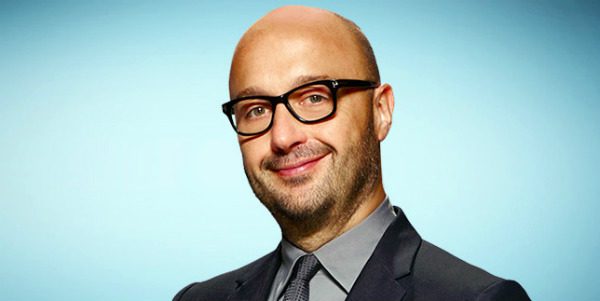On CNBC’s Tuesday-night reality show “Restaurant Startup,” restaurateurs Joe Bastianich and Tim Love choose between two would-be restaurant owners and pick one in which to invest their own money.
Bastianich is already familiar to TV viewers for his role as a judge, alongside chefs Gordon Ramsay and Graham Elliot, on both Fox’s “MasterChef” and its spin-off, “MasterChef Junior,” which both give amateur cooks — adults and children — a chance to show off their skills for the experts.
A native New Yorker and a cradle Catholic, Bastianich grew up in the restaurant industry, and his mother is celebrity chef and author Lidia Bastianich (“Lidia’s Italy in America”).
When Lidia Bastianich was a youngster living in a refugee camp in Italy with her parents and brother, a Catholic relief organization arranged transport and visas for her family to come to America — but first they went to the Vatican to get the blessing of Pope Paul VI.
In 2008, Lidia came to a “closing of the circle,” in her words, when she cooked three meals for Pope Emeritus Benedict XVI during his visit to New York City.
Click here for downloadable press kit that features her full menus for a lunch and two dinners, which included asparagus soup, ravioli, risotto, apple strudel, beef goulash and chocolate-hazelnut cake.
Her son, who is also a wine enthusiast, picked all the wines for the meals, which came from the Bastianich vineyards in Italy.
In January, I sat down with Bastianich — who said he was a “theology major” — to find out what he’d serve if he had a chance to cook for Pope Francis during his visit to the United States this fall.
But first, we talked wine.
“I take my first glass of wine,” said Bastianich, “for general health, and the second glass of wine is for my savvy comebacks and my impeccable dance moves. Wine is religion, and I believe in the power of wine. Wine has changed my life, and wine has always brought me in the right direction.
“And, Jesus Christ drank wine.”
Regarding his mother’s menu for Benedict, Bastianich said, “She made him Bavarian-style dishes. He doesn’t eat a lot of red meat, so she made him fish with braised leeks and potatoes, in the German style, with mustard seeds. She made him a green-bean salad with vinegar. All things that were very southern-German, things he might have eaten as a boy.
“She wanted to, in some way, connect with him and stir his food memories. So, this pope is Argentinian, so we have to give him meat, right? Of course.”
As to the actual menu, Bastianich said, off the top of his head, “It might be a beet and goat-cheese salad with red onions and a champagne vinaigrette, followed by a risotto with seafood, maybe a crab risotto, followed by a steak. We’d have to cook in the Vatican residence in New York, and the kitchen is vintage, so probably not do a grilled steak where you need a broiler. Maybe I’d do a prime rib, like a whole prime rib of beef.”
Argentinian beef, one assumes? “Yeah, of course.”
For most people who love to cook, food is not just a sensory experience but also a cultural and spiritual one. Bastianich is no exception.
“Taking food out of the realm of sustenance,” he said, “and bringing it to the level of … man, food for us is how we preserve our identity, our culture. My family is Italian immigrants who came here after the war and left everything behind. They’re from northeastern Italy, Trieste, Istria, the border of Yugoslavia.
“They came here in 1951, left everything behind. They were political refugees, brought here by American Catholic charities. My grandmother and my mother … they use food as a way to communicate to their grandchildren, my children, today. It’s not a way to sustain, it’s also a way to show love; it’s a way to communicate a culture, a history.”
The restaurant business remains central to Bastianich’s life.
“That was a blue-collar job in the ’70s,” he says. “It was a way that immigrants who had no education could survive. Food was a way we paid the rent, we paid for school, we got to feed ourselves. It was also a way that we could maintain the culture that we came from.
“So, it’s that sense of place, a sense of what you belong to, the culture you came from. That’s what’s great, how it develops into restaurants. After school, I wouldn’t go home, I would go back to the restaurant. So, being able to do a show like ‘Restaurant Startup,’ and really communicate about what my life is restaurants is — that’s all I’ve done my whole life.”
But on the show, Bastianich emphasizes to the participants that a restaurant can’t live on love alone.
“A restaurant that doesn’t make money will never exist,” he said. “That’s the story of ‘Restaurant Startup.’ Yeah, it’s the sex appeal of restaurants and food, but it’s also the business of, how do you make money in a restaurant? Why are margins so important? It’s primarily a business show that revolves around food and restaurants.”
As we’re now into Lent, which means Easter is not far off, I asked Bastianich what would be on his Easter menu.
“Lamb, of course. So, a whole bacio alla romano, which is baby lamb, quartered, pan roasted at high head, deglazed with vinegar, olive oil and rosemary. It’s the spring, so you have peas and favas with leeks, cooked and braised down, so it almost becomes a mushy peas. Then smashed potatoes, Tuscan-style. So fingerling potatoes roasted crisp and seasoned with extra virgin olive oil.”
Asparagus?
“Of course — wild asparagus with boiled eggs and a red-pepper vinaigrette, because asparagus and eggs always have to live together. And then you have the perfect Easter brunch.”
To finish off, I asked Bastianich what someone could say to him that would convince him they were NOT meant for the restaurant business.
“‘I am a really passionate and talented cook, but I have no idea about business.’ I would say to them, ‘Keep cooking at home.'”














